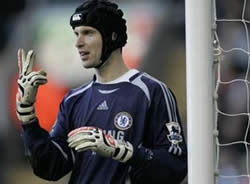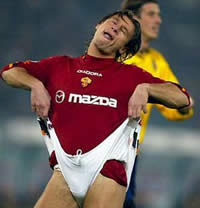Author: Vadim Rudnev
Dedicated to football fans
Valery Anashvili and Vladimir Shuhmin
 Football is a game played by feet. In a nutshell, our understanding of symbolic function of the foot is reduced to the fact it being a substitute of a virile member and – even wider – in general, a sexuality substitute – and even wider – a substitute of a man. (“The man is an animal with no feathers walking on two feet”).
Football is a game played by feet. In a nutshell, our understanding of symbolic function of the foot is reduced to the fact it being a substitute of a virile member and – even wider – in general, a sexuality substitute – and even wider – a substitute of a man. (“The man is an animal with no feathers walking on two feet”).
Strangeness of using feet in a game, moreover, in the most popular game in the world, lies in using the foot not in creation, not in creativity, but in destruction, opposite to the function of the hand (Cf. a word combination “to tread under foot”; a death symbol – “feet first”). A person without a hand is a mere cripple, a person without a foot is a hypertrophic sexual freak. Here we will recall an interpretation by Sokolov of a fairy tale about a bear on a lime foot, whose ominous skirl reminds the main character of bed creak during coitus (for detail see [Krasnov 1998]).
In this sense the foot in football is opposed to head which is, first of all, surely a substitute and analogue of the ball. And here comes the most important. The identification of the ball with player’s head (one can play by head, as well as by feet leads us to archaic game with chopped off heads, even, more likely, with brains of enemies which was enjoyed by the ancient Irish [Herm 1976: 153] The game, by the way, was called – brain-balls [Macalister 1996: 81].
The saga “Death of Konhobar” reads as follows:
The ulads had a custom at that time to take out brain from head of each man killed by them in a battle. This brain was mixed then with lime and they made a hard ball of it… [Abduction of a bull from Kualnge 1965: 346].
And further on:
At that time jesters were playing with Mes Gesra’s brain [op. cit.: 347].
The chopped off head is a symbol of depriving the opponent of power and force – and one can protest against “panpsychoanalytism” to his heart’s content, but, apparently, it is clear that it is a castration substitute.
But what for to play with the chopped off head? Our problem does not include understanding of what the game is in general. This is in Wittgenstein and Heizinga’s line. But in this case it is evident that football as a game is very similar to sexual game (unfortunately, Heizinga shows too much tactfulness for a scientist at this point). Connection between archaic “agonal instincts” (Heizinga’s term) and modern game competition is also obvious. Of more interesting is another aspect: his explanation of why football has originated in England:
“The fact that this phenomenon has arisen for the first time in the XIXth century in England is understandable to some extent, whereas the role of specific English national character contribution – no doubt – remains vague in its sources and difficult to predict. But influence of the English society is absolutely certain. Local government strengthened the spirit of local interaction and solidarity […] besides, of special importance, apparently, was a relief and a landscape, offering in luxurious meadows, common’s magnificent places for games” [Heizinga 1992: 222-223].
Superb, decent, and, the main thing, not a word about sex. But meanwhile exactly connection with national English character is obvious. The end of the XIXth century – Victorian Age when it was indecent for a woman to move in bed during sexual intercourse – she was to lie on back quietly and calmly. Flourishing and simultaneous decline of the English national character – stiffness, unsociability, decency, “Obsession- compulsion” [Reich 1999]. And here comes football played by feet. Distinct sublimative function of football is obvious during the epoch with explicitly suppressed sexuality.
 |
What is the goal (goal – a goal) of playing football? It is kicking (dragging) a round subject by feet (substitutes of genitals) in a certain limited space (compared to the football ground as a whole gate is a rather limited space), in the net, in a hole. Is it necessary to provide examples from “Interpretation of dreams”?
Thus, a football game simulates a sexual intercourse where the foot acts as a phallus, a ball – as sperms, and gate – as vulvas. The role of a woman impregnated by hitting the target is played, of course, by Earth Mother (football on ice is unnatural – field hockey, to my knowledge, exists. Hockey is a frozen, frigid football, Snow Queen, Tsarevna Nesmeyana (Note: Tsarevna Nesmeyana – a character of a Russian fairy tale, the daughter of a tsar nobody could make laugh): in sexually repressed USSR football, especially in international arena, was no good, however, and we were world champions in hockey almost more than ten times successively. In hockey sexuality is more sophisticated – instead of a round ball – a flat puck, feet have skates- contraceptives on (a flat puck is not a ball-sperm, but a contraceptive pill) [1] and even phallus is artificial (hockey stick) – but getting the goals is a purely Soviet man’s bragging: how many “sticks” (sticks) “plugged” for a night.
But we have considered the problem connecting football and sexuality only at the level of the first Freud’s topic (opposing instances of conscious and unconscious).
But nevertheless, the first topic is insufficient to interpret, for example, such an important figure in football as a goalkeeper, and thus, to explain it in psychoanalytic terms. The goalkeeper is a defender of the gate (!), the censor withstanding players’ desires (the judge keeps an eye on observing the rules, but does not interfere with the desire, he interferes only in case something goes wrong – judge is Father whose function suggests regulating love lives as social lives in switching them onto normal tracks [Lakan 1997]). At this point we need the second topic – “The Ego and the Id” [Freud 1990à]. Sure thing, the Ego is a common player aiming at achieving satisfaction, the Id is the ball incarnating libido in itself (here’s to analogy of the ball and the head (we will reconsider analogy “head – goal – naked [2] – (penis) head” (Note from the translator: All these words begin with the same letter combinations in Russian.) – “there are strange convergences”, as Pushkin wrote!) but the goalkeeper is the Superego, a substance that hinders satisfaction of the desire and enjoying scoring a goal. (And what can the pleasure be when there is no obstacle?). If the player thinks first and foremost of himself, about satisfaction of his desire, the goalkeeper thinks first of all of the team. Opposition of the ego-player to the superego-goalkeeper is shown in a football episode of the novel by Yu.Olesha “Envy” where the German forward Getske is opposed to the Soviet goalkeeper Volodya. “The general course of the game was important for Volodya, the general victory, the outcome, Getske was striving to showing off his skilfulness”. At that it is important that the match occurs against the background sexual atmosphere of Kavalerov and Valya’s relationship. It is significant that when the ball, getting onto a tribune, falls directly to Kavalerov’s feet, he could not bring himself to lifting it and throwing it back to the field, thus confirming his complete sexual inconsistency in Valya’s eyes.
 |
A special role of the goalkeeper, the keeper, the goal holder (goalkeeper) is embodied in his having the right to take the ball in his hands (as a matter of fact, to rumple and to compress it (compare etymology of the word “ball”), (compare also Hamlet playing with the skull of Yorik – a topic of correlation of sacral and profane, life and death in football that will be dealt with below), in fact, to masturbate with it, carrying out function of restraining sexual destruction, its introduction in a reasonable “reality principle”. (The child living by the principle of pleasure being trained to play football cannot understand for a long time why it is not allowed to take it with hands – since it is so convenient, so pleasant.)
To finish with Freud, we will consider thereupon the third topic – opposing the instinct of life and the instinct of death [Freud 1990b]. The Superego-goalkeeper evidently, on the one hand, opposes the destructive desire of the opponent, i.e.it guards life. But on the other hand, satisfaction of desire is aimed at life continuation (“fertilization” of the gate), therefore, the goalkeeper (“gatekeeper”) simultaneously protects lives of his team and approaches death of the opposite.
Psychoanalytic sense of football infectiousness lies in its sublimativity.
The man likes to play so much, and even more – to watch football on TV (relaxed after work, lounging in armchair and slippers well-tried by our advertising so far) because he has got tired and is eager to “plug” and, of course, first of all, in “the opposite gate”. That’s where the principal sense of the game lies – struggling for what? For a woman? More likely, for impossibility of superfluous desire which so reiterated by Lakan and Zhizhek [Lakan 1998; Zhizhek 1999]. Football is that obscene object of desire spoken by Zhizhek in his last book. Why is it obscene? Because it is obscene to watch football. It is called “voyeurism”: to watch others plugging.
Nevertheless it is necessary to clarify the ball and head phenomenology. After all, it is clear that they are substitute objects mentioned above, referring to ancient Irish. The head, of course, has an obscene symbolization as well, not without reason it is possible to beat off the ball by head, as well as by foot. But the matter is not only this point. The ball as a bundle of sexuality and the head a bundle of intellectuality generates interesting parallels. Let’s say, for example, a parallel between football and chess. There seems to be no other more opposite kinds of sports. In football the body is mobile and the head almost does not participate. In chess the body is motionless and brains are mobile. Naturally, it does not mean that it is not necessary to think in football. But only not with the head. (As well as in love, surely.)
 Photo from funnyhub.com |
Chess is a favourite example of structuralists (Saussur, Lakan, Shaumyan, Revzin), football is an intellectual entertainment of postmodernists. Why? For structuralism (anyway, the Soviet one) sexual subjects were of no importance (partially, of course, because it was under a ban; Bart was considered to be a structuralist in initial stage of his creative work, but he did not disdain psychoanalysis even then (by the way, see about Bart’s structuralism Rudnev 1990] [). Anyway, Soviet structuralists explicitly (and, likely, sincerely) did not recognize psychoanalysis (compare antifreudian declaration by Yu.M.Lotman [Lotman 1992]. (Certainly, they did not know it well enough) Surely it does not mean that if we tried thoroughly we would not find latent psychoanalytic motives in works by Lotman (partially it was done in article [Plutser-Sarno 1998]). The sexual becames one of the main study subjects by poststructuralists and postmodernists (at least just Michel Foucault!). Why? Because for post-structural (in a broad sense) science and philosophy body, power and history became major subject matters. But the body can be crippled, the power can be abused and history can be rewritten. What has it to do with football and sexuality? It has the most straightforward connection. Crude corporality, strong-arm tactics, injuries, mutilation. Take at least phenomenology of so-called “wall”! The player strikes penalty kick – a group of men stands nearby and covers with their hands the most important thing, as Hitler and Mussolini in “Ordinary Fascism”. Football is a totalitarian game or even, more likely, post-totalitarian. The “wall” allegory is extremely expressive in the light of comparison of football and chess – the main point is to protect the most necessary place. But you can hit the ball with the head as much as necessary. The chess player intuitively, sitting at a table, embraces his head with his hands.
And here again comes the head. You can’t do without it.
It looks as if there were a missing link which would take discussion of football from purely psychoanalytic subject matter. What link is it? We will consider a football space. Here three oppositions can be clearly drawn: a small, round and volumetric ball, on the one hand, and large, rectangular and flat field, on the other. Gate carries out, as well as all similar objects, a meditative function: it is not as big as the field, and is covered with a net [3], but rectangular in shape. So, across a rectangular field animated objects move and by means of simple tricks with feet they try to roll a small round object in a rectangular aperture.[4] Is there anything strange about it? Strangeness lies in two-dimensional football. Blow upwards is practically not functional, blow downwards is practically impossible (unless by head). But after all, we live in three-dimensional world. What imposes three-dimensional perspective to football? The Earth and the sky. And the ball. And the head.
Football unlike hockey, basketball and volleyball, is played on grass, in the open-air. Therefore its space being flat is simultaneously boundlessly open. The ball, as a matter of principle, can fly away anywhere. To fly away and not to return. It can be taken away by spectators as a souvenir, it can be punctured with something and, at last, just be lost the sight of in the sky.
In the poem by Agnia Barto:
Little Tanya’s sadly sobbing,
On the waves her ball is bobbing.
The girl is crying not because she thinks the ball will sink, as stupid parents suppose, but because to get this object of desire it is necessary to throw oneself into the river, in the waters of the incognizable, of sex and death. The space of football is “love and death space” as well as dreams space [Rudnev 1994]. (The person watching football on TV is almost sleeping, daydreaming; he completely dies during this moment for the world of those awake.)
In this sense identification of the ball with the head that was felt so subtle by the best Russian poets writing about football, is expanded to the scale of the Universe.
Mandelstam, the poem “Football”, sounds odd, as usual:
The bodyguard was poisoned,
In the unequal fight he fell,
He was disfigured and beheaded,
That thick-skinned God of Football.
Was it like when the throng got crowded
His painfully-still-alive,
With his cup not drunk up yet
His stupid head rolled down to his feet?
Judith, was it the same when hypocritically –
Beyond any understanding –
Enemies mocked with their foot tips
Over Olofern’s warm corpse?
Thus, a football ball connotes with the chopped off head (head of St. John the Baptist – the Christian theme of bodily and spiritual torments, therefore, of Christ is added to the passion theme; head of Îlofern – the war and treachery theme is added to the sexual theme, – certainly, the football ground is associated with the field of fight (imagine in the spirit of “BhagavatGita”, that Maradona, like prince Ardzhune, instead of hitting the penalty kick, has suddenly fell into thoughts, moved the ball with his feet and fell on the raw Earth Mother), with all mythological apples collectively taken, and, the most important thing, to the Globe as well. The football player runs across a horizontal football ground with a ball and the aim of scoring a goal, “plugging in”, and vertically another wedlock is being made, between the Earth and the sky, between the Universe and its Creator.
 Photo from visualparadox.com |
Zabolotsky’s poem with the same name “Football” is even stranger. It’s rather long (56 lines), therefore we are unable to quote it here as a whole. In this poem running of the hero-forward turns into his being beaten by his opponents, being poisoned and, naturally, decapitated. At that the ball obviously turns into the Earth. And this triad: ball – head – the Earth – certainly defines profound semantics of this text about football, the sense of which, to my mind, is as follows: horizontal running of the forward in his way to win, to realize his desire, is absolutely superficial, the most important occurs on a vertical where microcosm, the profane (ball) comes in touch with sacral macrocosm (the Earth) by means of negative mediation with decapitation, and is the most important. (compare also appearance of eschatological sphere going through the wall of the church in “Orchestra Rehearsal” by Fellini; the sphere kills the harpist, but after this victim chaos of revolt against the conductor is restored little by little in “space after chaos”).
What we call football conceals an extremely archaic and significant ritual-mythological victim of sexual character, of course, but the main semanteme of which is a statement of indivisible spherical space compactness, stability through rupture of an individual body, through dissatisfaction of superfluous obscenity of desire. The fact that the ball gets into gate is, certainly, important, but of more importance is the forward turning out to be a scapegoat, scoring a ball in the gate, space copulation of his head with the earth head is, perhaps, the most important.
Poets underline not courage and strength in football, but something absolutely opposite: what, probably, was at the beginning – a certain primary archaic victim where the defining role was played by the chopped off head and whose sense, as we only can vaguely guess, falls far beyond the limits of demonstration of power and victory over the opponent, this sense is much wider and more cosmological. These are some magic sacrificial manipulations with the Earth, with the whole Universe. All of it should be more or less familiar to mythologists or anthropologists. But I wished only to underline, that any socially significant thing looking extremely trivial (full up man in front of the TV or storming crowd of fans – that is closer to the archaics – we will recollect Cortazar’s story “The Maenads”, where spectators of a symphony concert eventually tear the maestro to pieces in ecstasy), conceals in itself intertwining archaic deep motives and undisclosed secrets.
In extreme moments of a society life archaic and cosmic suddenly shows through profane. In 1942 in the occupied Kiev the Germans arranged the so-called “death match”. The Russian team was to have lost to humiliate its national dignity. The Russian team won. The victim was offered. It is interesting that practically the same occurs in the novel by Lithuanian Jewish writer Ishakas Meras: the action is being played between the chief of a ghetto and the boy-chess player. They play chess provided that if the boy lost the camp chief would release several prisoners. If the boy won, he would die, and several prisoners would be hanged up. The boy wins, understanding practical (but, obviously, not spiritual) uselessness of the victim.
Since archaic and gloomy in postmodernist consciousness is essentially connected with comic-profane, still in conclusion we will recollect once again the girl Tanya from the poem by Barto, who turns into a little girl-the girl-the woman-the old woman in the song by Okudgava.
In the first case the girl is crying about a victim, in the second case it is said that the victim is vain because the ball always comes back.
The little girl is crying [5] – the ball has flown away.
She is consoled, and the ball is flying.
The girl is crying – the groom is not to be seen.
She is consoled, and the ball is flying.
The woman is crying – the husband has gone to some other.
She is consoled, and the ball is flying.
The old woman is crying – her life term was short.
And the ball has returned, and it is blue.
The ball always comes back. [6]
“Published with the author’s permission”, http://www.ruthenia.ru
References:
Zhizhek S. The sublime object of ideology. Ì, 1999.
Krasnov P.A few lessons at virtual sex school named after Sasha Sokolov//On the Post, 2, 1998.
Lakan Z. Instance of the letter in the unconscious, or destiny of mind after Freud. Ì, 1997.
Lakan Z. Seminars. Book 1. Freud’s works on psychoanalysis technique (1953/54). Ì, 1998.
Lotman Yu.M. About reduction and development of sign systems (to the problem “freudism and semiotic cultural science”//Lotman Yu.M. Sel. Articles. Vol. 1. Articles in semiotics and culture typology. Tallinn, 1992.
Abduction of a bull from Kualnge. Ì, 1965.
Plutser-Sarno A.Grey-haired naughty fellow: Strokes to the portrait of Yu.M.Lotman// On the Post, 2, 1998.
Reich V. Character analysis. Ì, 1999. (Ðàéõ Â. Àíàëèç õàðàêòåðà. Ì., 1999.)
Rudnev V. Looking for the lost structuralism//Daugava, 7, 1990.
Rudnev V.Dreams in love and death space. Covcheg, 1, Kiev, 1994.
Rudnev V. Away from a reality: Studies in text philosophy. II. Ì, 1999.
Freud Z. The Interpretation of Dreams. Yerevan. 1991.
Freud Z. The Psychopathology of Everyday Life//Freud Z. Psychology of the unconscious. Ì, 1990à.
Freud Ç. The Ego and the Id// Op.cit., 1990b.
Freud Z. Beyond the Pleasure Principle// Op.cit., 1990c.
Freud Z. Jokes and their Relation to the Unconscious//Freud Z. The Artist and Imagination. M. 1995.
Heizinga J. Homo ludens; In the shade of tomorrow. Ì, 1992.
Tsyganenko G.P. Etymologic dictionary of the Russian Language. Ê, 1989.
Herm G. The Celts: The People who came out of darkness. N. Y. 1976 p. 153.
Macalister R. The Archeology of Ireland. L., 1996.
[1] Idea by V.Shuhmin.
[2] Etymology of the word “naked” is interesting in this aspect. “Naked” is the one having no hair on his head, bald [Tsyganenko 1989: 88] (as a football ball), i.e. words “naked” and “head” – are derivatives of one root (Note from the translator: it pertains to Russian) – The goalkeeper (goalkeeper), is, therefore, not only a keeper of goals (goals), but also a keeper of “hotheads” of his team mates what corresponds to SuperEgo function. And in general, in this football all etymologies are completely psychoanalytic. The word “ball”, for example, goes back to the word “to rumple, compress” (“ball” originally meant “an object that can be squeezed, compressed” [Op.cit.: 248]). Gate is an object intended “to lock, protect, close” [Op.cit.: 68].
[3] There is a widespread legend as a certain sovereign declares that he will marry a girl from the common people who will demonstrate an outstanding mind. She should execute a series of mutually exclusive conditions: to arrive to him neither on foot nor on a horse, neither naked, nor dressed, neither with a gift, nor without a gift. Finally, a clever girl comes, sitting on a goat, wrapped in a net and holds in hands a basket with a hare (gift) which at the moment of donation immediately escapes).
[4] To add up to sexual topology – “phenomenology of a penalty area”, the essence of which can be formulated as follows: the closer to the object of desire, the more rigid and refined the rules are (isn’t it the same in sex?).
[5] In effect, it is not at all essential for this girl to be namely Tanya from the poem by Agnia Barto. – V.R.
[6] I express my warmest regards to my wife, Tatyana Mikhaylova, for her contribution with Celtic and general folklore material. Vladimir Shuhmin has taken the trouble of editing the text of the article, for what my friendly thanks to him, as well as for those ideas he shared with me and which were so abundant that I, unfortunately, was unable to refer to his name at each page all the time.
Leave a Reply